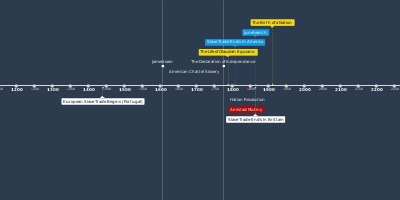1 mars 1842 - Prigg v. Pennsylvania
Description:
Supreme Court case in which the court held that the federal Fugitive Slave Act (1793) precluded a Pennsylvania state law that prohibited blacks from being taken out of the free state of Pennsylvania into slavery. The Court overturned the conviction of slavecatcher Edward Prigg as a result.Prigg v. Pennsylvania also weakened the enforcement mechanisms of the Fugitive Slave Act of 1793 by allowing states to forbid their officials from cooperating in the return of fugitive slaves. But, by asserting federal government authority and responsibility over the area of fugitive slave return, it set the stage for future more stringent laws that would bypass individual state decisions about slavery.
March 29, 1788, Pennsylvania amendment to one of its laws (An Act for the Gradual Abolition of Slavery, originally enacted March 1, 1780): "No negro or mulatto slave... shall be removed out of this state, with the design and intention that the place of abode or residence of such slave or servant shall be thereby altered or changed."
March 25, 1826, Pennsylvania law:
If any person or persons shall, from and after the passing of this act, by force and violence, take and carry away, or cause to be taken or carried away, and shall, by fraud or false pretense, seduce, or cause to be seduced, or shall attempt so to take, carry away or seduce, any negro or mulatto, from any part or parts of this commonwealth, to any other place or places whatsoever, out of this commonwealth, with a design and intention of selling and disposing of, or of causing to be sold, or of keeping and detaining, or of causing to be kept and detained, such negro or mulatto, as a slave or servant for life, or for any term whatsoever, every such person or persons, his or their aiders or abettors, shall on conviction thereof, in any court of this commonwealth having competent jurisdiction, be deemed guilty of a felony.
Prigg and his lawyer argued that the 1788 and 1826 Pennsylvania laws were unconstitutional:
First, because of the injunction in Article IV of the US Constitution: "No person held to service or labor in one state, under the laws thereof, escaping into another, shall, in consequence of any law or regulation therein, be discharged from such service or labor; but shall be delivered up, on claim of the party to whom such service or labor may be due." (superseded by the Thirteenth Amendment, ratified on December 6, 1865.)
Second, because the exercise of Federal legislation, such as that undertaken by Congress in passing the 1793 Fugitive Slave Act, supersedes any state law. As a consequence, they argued, the 1788 Pennsylvania law, in all its provisions applicable to this case, should be voided.
Writing for the Court, Justice Joseph Story reversed the conviction and held the Pennsylvania law was unconstitutional, as it denied both the right of slaveholders to recover their slaves under Article IV and the Federal Fugitive Slave Law of 1793, which trumped the state law per the Supremacy Clause [(Article VI, Clause 2), establishes that the Constitution, federal laws made pursuant to it, and treaties made under its authority, constitute the “supreme Law of the Land”, and thus take priority over any conflicting state laws.]
Although Story ruled the Pennsylvania laws were unconstitutional, his opinion left the door open for the state to forbid state officials to cooperate in the return of fugitive slaves:
"As to the authority so conferred upon state magistrates [to deal with runaway slaves], while a difference of opinion has existed, and may exist still on the point, in different states, whether state magistrates are bound to act under it; none is entertained by this Court that state magistrates may, if they choose, exercise that authority, unless prohibited by state legislation."
However, state laws could not interfere with a slave-owner's right to go to another state and recapture a fugitive slave by private action, as long as no breach of the peace was committed.
Ajouté au bande de temps:
Date:
1 mars 1842
Maintenaint
~ Il y a 183 ans
